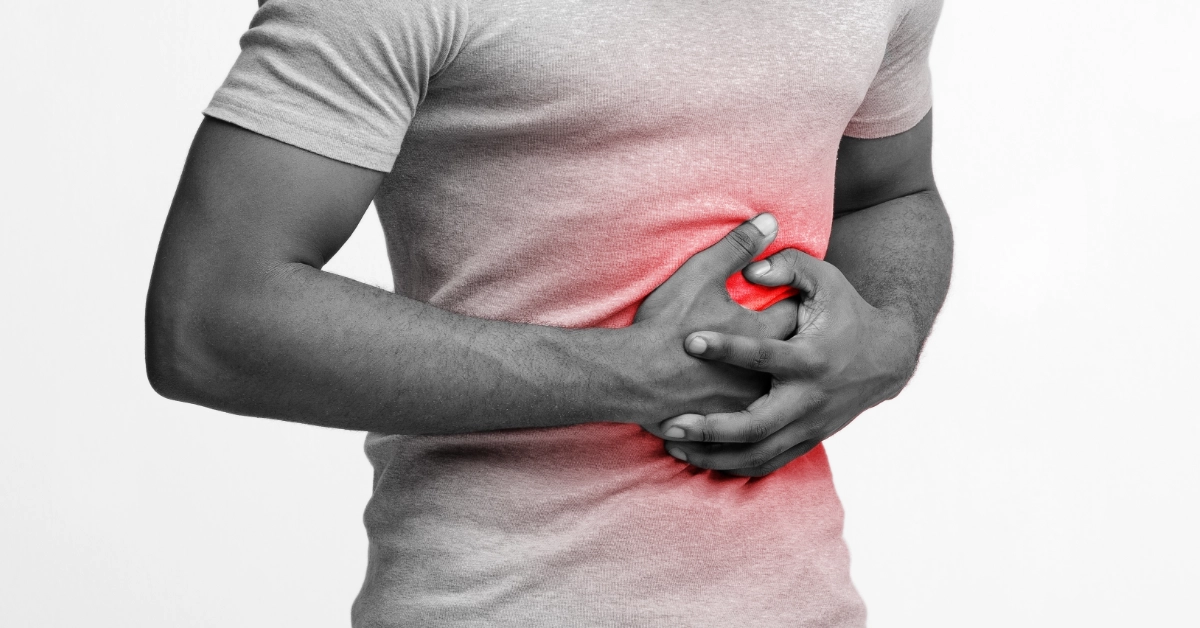We are all likely to experience abdominal pain from time to time. It can cause considerable discomfort. There can be many causes. Identifying the location and cause of the pain is important for diagnosis and treatment.
Because there are so many organs in the abdomen, the cause of abdominal pain can be difficult to diagnose. To narrow down the location of the pain and the organs that could be affected by it or causing it, doctors consider the abdomen as divided into four quarters or quadrants.
The top quarter near your ribs on your right‑hand side as you look down at your abdomen is the right upper quadrant (RUQ).
The RUQ contains many important organs, including parts of your liver, right kidney, gallbladder, pancreas and stomach, as well as the large and small intestine. Pain in this quadrant can indicate a number of diseases or conditions.
Common RUQ symptoms
RUQ pain often varies in intensity depending on any underlying health conditions. The pain may feel like a dull ache that is difficult to shake off or a sharp excruciating and sometimes stabbing sensation.
Most abdominal pain is minor and just causes discomfort. However, sometimes it may be serious. Sudden severe pain usually indicates something serious is happening.
Some symptoms may indicate a medical emergency needing immediate professional medical attention, such as severe abdominal pains, fever, persistent nausea and vomiting or blood in your stool.
Other symptoms that require urgent attention include swelling or tenderness in your abdomen, unexplained weight loss and yellowish skin or jaundice.
Causes
Visceral pain is a response to your organs stretching or the muscles around them contracting. It is usually dull, vague, nauseating and hard to pinpoint.
Sometimes there is referred pain, where problems with an organ in your abdomen may cause pain not only in your abdomen but also in another part of your body, such as your shoulder.
Somatic pain is a sharp pain that is easy to pinpoint resulting from the nerves in the peritoneum, the membrane that lines your abdomen, responding to irritation usually caused by infections in an organ that result in liquids leaking out, causing pain and peritonitis.
Kidney problems such as kidney stones, a urinary tract infection (UTI), a kidney infection or kidney cancer can lead to RUQ pain.
The most common symptoms of these conditions include pain that radiates to the lower back or groin, painful urination, foul-smelling urine, frequent urination, blood in your urine, fever, nausea and vomiting.
Liver conditions can also lead to RUQ pain. These include hepatitis, a liver abscess or liver cancer. In addition to the pain, other symptoms of these may include yellowish skin, abdominal tenderness, nausea or vomiting, darkened urine, fever, fatigue and unexplained weight loss.
Preeclampsia can also cause RUQ pain. This typically occurs in women who are at least 20 weeks into their pregnancy, although it can develop earlier in pregnancy or even after childbirth.
Additional symptoms can include severe headache, nausea or vomiting, decreased urination, protein in urine, kidney or liver problems, blurred vision or sensitivity to light and shortness of breath.
Gallbladder problems such as gallstones or choledocholithiasis, a condition where gallstones obstruct the bile duct, can cause RUQ pain that may last several hours. It most often occurs after a large meal or in the evening. Additional symptoms can include nausea and vomiting, fever, chills, darkened urine or light-coloured stools and yellowish skin.
Gastrointestinal issues such as indigestion, gastritis and peptic ulcers can cause RUQ pain that typically is a dull, burning type of pain. Other symptoms may include a feeling of uncomfortable fullness, abdominal bloating, burping or gas as well as nausea or vomiting.
Pancreatic conditions, especially if the pancreas is inflamed, can make you feel RUQ pain. This is known as pancreatitis. The pain slowly worsens over time. Additional symptoms can include nausea or vomiting, fever and an increase in your heart rate.
Other conditions that can cause right upper quadrant pain may include an injury or trauma, pneumonia and shingles
Treatment
Treatment depends on the cause of the pain. Common treatment includes pain relievers. Antacids may be taken to help neutralise stomach acid.
Proton pump inhibitors or acid blockers to reduce the amount of acid in your stomach or intestines may also be taken. Antibiotics may be prescribed to kill bacteria causing an infection.
A surgical procedure, such as to remove gallstones or excise a tumour may be performed. Most doctors try to avoid surgery whenever possible but it may sometimes be necessary.
If kidney stones are too large to be passed naturally, your doctor may use sound waves to break the stones into smaller pieces that can be passed. A scope may also be used to remove them.
If the pain is caused by cancer, treatment such as chemotherapy, radiation therapy or immunotherapy may be proposed.
If you are diagnosed with kidney or liver cancer, surgery may be necessary to remove a tumour, depending on the cancer’s stage and severity.
Complications
Possible complications include kidney infection due to an untreated urinary tract infection, high blood pressure, kidney failure or scarring from an untreated infection, low birth weight, pre-term birth, organ damage, or death from unaddressed preeclampsia.
Inflammation or infection of the gallbladder or pancreas can occur if gallstones go untreated. Other untreated conditions such as gastritis increase your risk of developing ulcers or stomach cancer.
Prevention
The risk of some types of RUQ pain can be reduced if you have a healthy diet, including foods rich in fibre such as whole grains, fruits, vegetables and beans, as well as foods with healthy fats such as olive oil and fish oil.
Avoid unhealthy fats found in fried food. Stay away from foods containing refined carbohydrates, sugars and salt. Drink lots of liquids. This can help flush bacteria out of your urinary tract.
Calcium supplements may be used but with caution to avoid kidney stones. Avoid indigestion by ensuring food is well cooked. Avoid food or drinks that are spicy, greasy or contain a lot of acid or caffeine.
If you smoke, consider quitting. Reduce your alcohol intake and maintain a healthy weight.
The information in this article is provided as a public service by the Cimas iGo wellness programme, which is designed to promote good health. It is provided for general information only and should not be construed as medical advice. Readers should consult their doctor or clinic on any matter related to their health or the treatment of any health problem. To contact the iGo team, email igo@cimas.co.zw or WhatsApp 0772 161 829 or phone 024-27730663.





